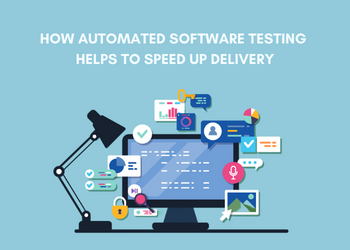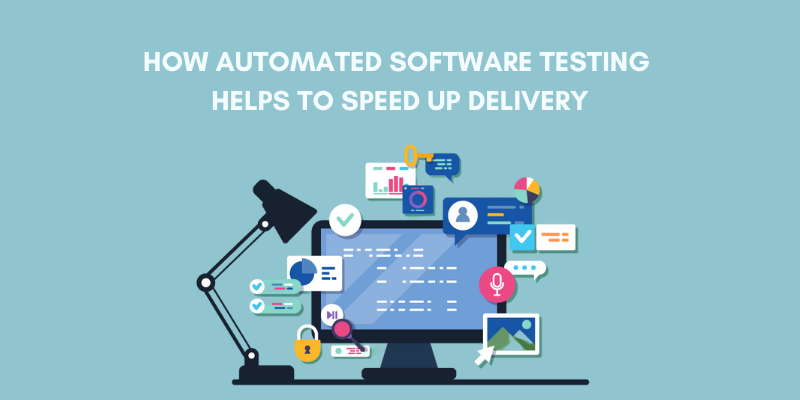How Automated Software Testing Helps to Speed Up Delivery

How Automated Software Testing Helps to Speed Up Delivery

Automation testing is not new to the software industry. Innovators have used automation to create more efficient, intelligent, and personalized software products, ranging from chatbots to data analysis solutions. Development teams have implemented internal automation to streamline critical aspects of the software development lifecycle (SDLC). For example, automated software testing simplifies repetitive, time-consuming, and laborious manual testing. Increasing the speed and accuracy of each test case reduces overall testing effort and cost.
This approach is discussed in depth in our quick guide to automated software testing and its importance in modern software delivery.
Manual Testing vs. Automated Testing Services
Manual software testing is when a tester runs the application and verifies the results. Manual testers document any flaws they discover. They may also determine the root cause of defects, recommend solutions, and validate fixes.
Automation testing is the execution of test scripts using an automated software testing tool. The tool runs pre-recorded test cases or scripts that the user specifies. These tools automate much of the manual effort required to perform functional tests. Automated testing services can perform pre-defined tasks, compare results to expected behaviour, and report status. The tool can run single or multiple tests in a single environment. It can also manage the life cycle of automated tests, such as data management, script creation, and test execution.
Read more: Different Types of Software Testing
Automated software testing yields faster feedback.
Automated software testing provides the team with immediate feedback to resolve issues before releasing code to production. The team can use automation to run scripts multiple times in a row. Furthermore, the test software automatically starts when the developer checks their code.
Automated feedback at code check-in
Automation software takes a snapshot of the test environment before running tests. A testing snapshot is a record of the test environment’s current state. It keeps track of which tests were run, passed and failed and optionally stores the actual test results in a database or spreadsheet.
Snapshots are also known as “test passes” or “test runs.” If something goes wrong, developers receive immediate feedback. This allows them to address the issue quickly. This is especially useful in large teams, where a developer can run all their tests before checking in their code, allowing them to see if any other developers have broken anything.
Allows teams to carry out testing early in SDLC
Once development is complete, teams typically perform manual testing. There are two issues with this approach. To begin, waiting until development is complete necessitates the team mass testing the entire software at once. The second disadvantage of deferring until the end of development is that testers will almost certainly have a large backlog of issues. Automated testing services enable teams to evaluate software earlier in the SDLC, allowing them to catch issues sooner.
The combination of Development and Operations (DevOps) is the key to testing earlier in the SDLC. The goal is collaborating with DevOps teams to deliver high-quality software more quickly. Teams can integrate automated testing software into the DevOps process in practice. As a result, the DevOps tools will run the tests automatically as part of the building and deploying code.
Automation testing reduces delivery bottlenecks.
According to a GitLab study, software testing is the most significant bottleneck in software delivery. These bottlenecks frequently cause delays as teams scramble to fix issues, lengthening time to market or resulting in sparse releases as features are cut due to bugs.
So, what are the most common causes of bottlenecks?
Teams are frequently forced to revisit unclear or outdated tests, update the test cases, and re-run them due to tester inconsistency.
When testing must scale to meet the growth of a software product, manual testing becomes inefficient because each tester is limited by bandwidth.
Automation simplifies testing. Machines, unlike humans, require precision and specificity in test cases, implying that testing is consistent and exact. Automation, similarly, enables teams to scale their testing efforts. They can add an unlimited number of tests and run them in parallel without hiring additional personnel.
Furthermore, automation can run tests repeatedly, providing feedback early and frequently in the SDLC. These benefits enable teams to address issues before delivery, avoiding a bug bottleneck.
Automated software testing allows for better test coverage
Software test coverage is the percentage of a program’s code executed by one or more tests. The more code that is tested, the less likely it is that a program will contain errors. However, automation testing allows for more granular testing than manual testing. Additional types of testing include:
Functional testing verifies the functionality of a software application by utilizing its user interface.
Unit testing is a type of evaluation that examines the functionality or code within individual units, modules, and methods. This method can be applied to a single class at a time, or it can be applied to multiple classes with different input parameters. Assume a method is used to calculate the total cost of a purchase order. The method is called several times with different arguments in a unit test. If one of the calls fails, both the test and the code have failed.
Integration testing ensures that all components of the system function properly. Integration testing is software testing that ensures that all of a system’s components work together. Integration testing is more complicated than unit and functional testing and may involve multiple components. Because the integration of new features can have an impact on the existing system, integration testing is a continuous process.
Why Choosing Bestarion as Your Software Testing Partner
Bestarion, leading software development and consulting firm, can provide your organization with the appropriate test environment and test automation tools to ensure that your company delivers the highest quality software product to the market.
Bestarion evaluates your existing platform and collaborates with you to create a custom automation strategy using agile methodology and proven best-in-class test automation tools.
Our software development pioneers help pave the way for a faster product release for your company by leveraging automation earlier in the delivery cycle.



